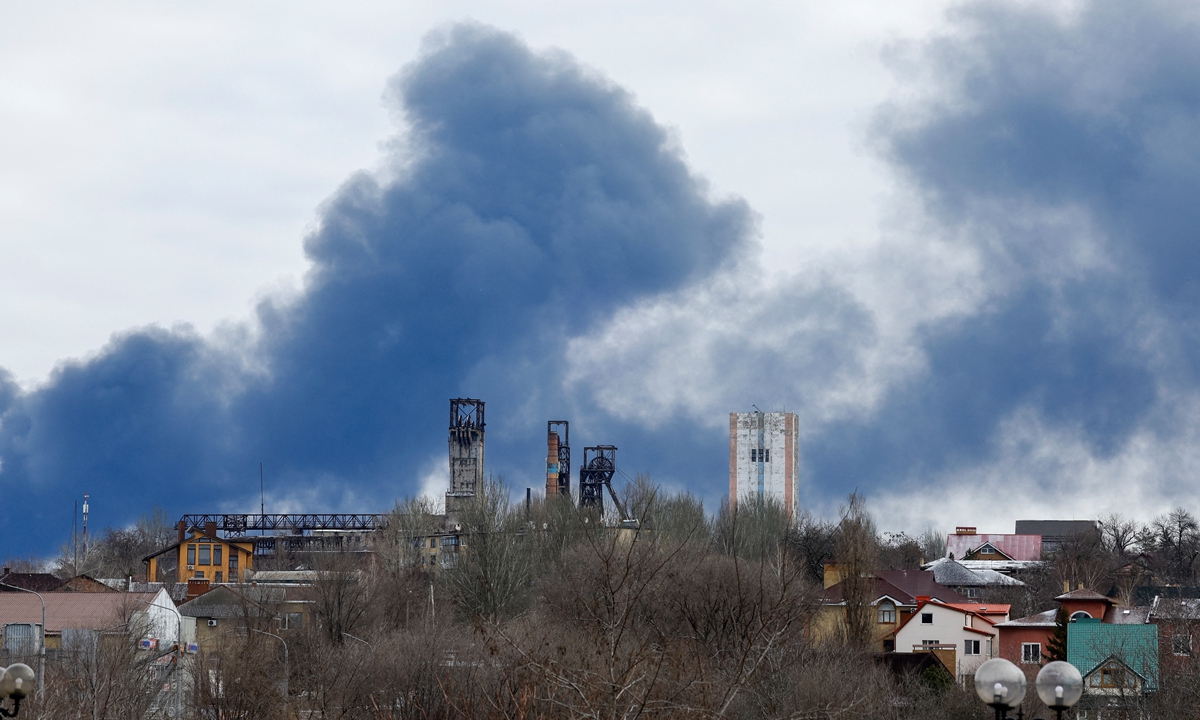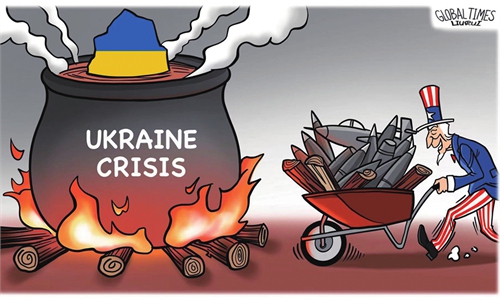
Smoke rises above buildings in the course of Russia-Ukraine conflict in Donetsk, Ukraine on February 19, 2024. Photo: IC
The G7 leaders held a virtual meeting on Saturday to voice their "unwavering support" for Ukraine with the participation of Ukrainian President Volodymyr Zelensky as the Russia-Ukraine conflict sees its second anniversary of the outbreak, and the G7 leaders issued a statement on the day to express "concern" about China-Russia business ties, with Chinese experts on Sunday refuting the G7's complaint on China's neutrality on the Ukraine crisis just exposed the weakness of the West.
China's stance remains unchanged over the past two years since the very beginning of the Ukraine crisis, and China's trade ties with Russia have been developed to very high level long before the outbreak of the conflict. China has right to develop its ties with Russia just like many other countries of the Global South have, and the G7 is in no position to complain about other countries' independent policymaking, experts said on Sunday.
China is not the reason the West has failed to undermine Russia through sanctions, and the West should admire and be grateful for China's neutrality, rather than expressing pointless complaints, and the world needs a major power to stay neutral instead of taking sides to let the crisis develop into a greater and uncontrollable geo-political disaster, analysts said.
Hypocritical complaint
The G7 statement that published on Saturday said that "We express our concern about transfers to Russia from businesses in the People's Republic of China of dual-use materials and components for weapons and equipment for military production."
The statement also mentioned two other countries - North Korea and Iran, and the terms are much tougher than the ones used on China. "We strongly condemn North Korea's exports and Russia's procurement of North Korea's ballistic missiles in direct violation of relevant UNSCRs [United Nation Security Council Resolutions] and call upon them to immediately cease such activities. We call upon Iran to stop assisting the Russian military and its war in Ukraine," the statement read.
The complaint from the US is much more direct than the joint statement of the G7. US Ambassador to China Nicholas Burns said on Thursday at an event to mark the second anniversary of the Russia-Ukraine conflict in Beijing that "The United States is disappointed that China continues to provide political and diplomatic support to Moscow…We are very concerned by the actions of Chinese companies that fuel Russia's defense industrial complex," and "its [China's] support to Russia that is very troubling indeed."
Cui Heng, a scholar from the Shanghai-based China National Institute for SCO International Exchange and Judicial Cooperation, told the Global Times on Sunday that "China's neutrality has been described as 'support to Russia,' and the US and the G7 have completely turned a blind eye to China's efforts on mediation. The statements from the G7 and the US ambassador just show that they want to force China to take sides and they show no respect to China's independent diplomatic stance."
Ma Xiaolin, dean of the Institute for Studies on the Mediterranean Rim at Zhejiang International Studies University, told the Global Times on Sunday that "the West is complaining to the wrong one." Nowadays, the volume of China-Russia trade just reached more than $240 billion, which is still relatively small compare to the trade with other major economies, and the trade is mainly about mechanical and electrical products, as well as energy, and the West can't blame China to have trade in these harmless fields with its neighbor.
Russia is a major power with comprehensive supply chain and industry chain to support its own military operations, and it has enough energy and food. These are the reasons why the West failed to undermine Russia by sanctions, Ma noted.
The West should be shamed and embarrassed, as their all-out sanctions and massive military aids to Ukraine in past two years have failed to weaken Russia, and now Moscow has more advantages on the battlefield and Russia is seeing economic growth in 2023, and their complaint to others only exposed their weakness and failure, said Li Haidong, a professor at the China Foreign Affairs University.
When Russia selling energy to China and other non-Western countries like BRICS members including India, Moscow is also selling its oils and gas to Europe indirectly through some special channels via some third parties, and it demands all buyers to pay in rubles, so when complaining about China, the West should look at what other countries, including many Western ones, are doing in the international energy market, rather than hypocritically blaming China, some experts added.
Challenge of disunity
Apart from complaint to other countries, the G7 members including Italy and Canada have signed security deals with Ukraine on Saturday as Western leaders rallied round a war-weary Kiev on the second anniversary of the conflict, with no end in the sight to the fighting, Reuters reported.
A Reuters report admitted that "Ukraine has suffered recent setbacks on the eastern battlefields, with its generals complaining of growing shortages of both arms and soldiers." Looking to dispel concerns the West is losing interest in the conflict, Italy's Giorgia Meloni and Canada's Justin Trudeau came to Kiev early on Saturday with European Commission President Ursula von der Leyen and Belgian Prime Minister Alexander De Croo, media reported.
Meloni signed a 10-year defense pact with Zelensky, and Trudeau signed a similar accord and pledged some $2.25 billion in financial and military support this year, Reuters reported.
Wang Yiwei, director of the Institute of International Affairs at the Renmin University of China, told the Global Times on Sunday that there is an increasing concern among the West about the potential change that might occur in the US. "The disunity about military and economic aids to Ukraine has exposed in the US Congress, and if Donald Trump wins the election later this year, the problem will be even greater."
Comparing to the US, who might view Ukraine as a pawn on the chessboard that could be abandoned one day if necessary, some leaders of EU members believe that the Ukraine crisis is much more like a matter of life-and-death due to their fear toward Russia, so they are now trying to do as much as they could to keep Ukraine from losing, Wang said.
But to what extent this kind of support could be sustained is still in question, as European countries are also facing difficult economic situation, and if Ukraine still fails to deliver some victories, it would be hard for Western politicians to convince their voters in the next elections, experts noted.
According to Time magazine on Friday, "Even in Europe, where support for Ukraine is widely seen as less divisive than it is across the Atlantic, an average of 10 percent of Europeans believe that Ukraine will win the war, according to a recent pan-European study by the European Council on Foreign Relations, while twice as many expect a Russian victory. The prevailing view (37 percent on average) anticipates that the war will most likely end in some kind of settlement."
When less and less people believe that Ukraine can win, there will be rising doubts about why they should keep paying for the deadly and costly war in Ukraine, especially when they are also suffering from inflation and other challenges, and whether the US-led West will keep their support to Ukraine or not, the West will be further divided as the conflict continues, Cui noted.


